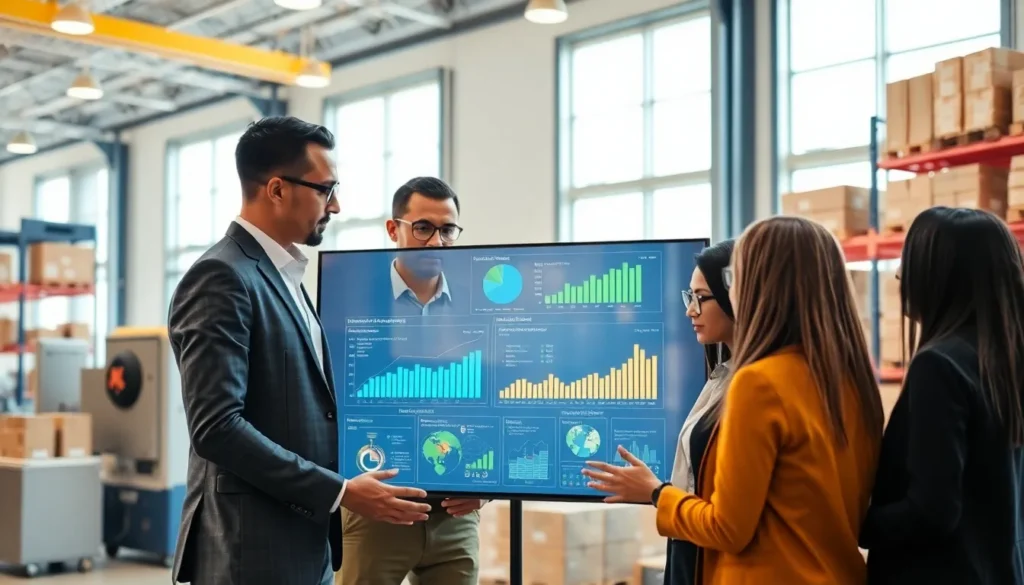Imagine a world where packages arrive at your doorstep faster than you can say “Is it here yet?” Thanks to artificial intelligence in logistics, that world is closer than ever. We’re not just talking about robots delivering parcels while skillfully dodging your neighbor’s overenthusiastic dog. We’re diving deeper into how AI is shaping modern logistics, slashing costs, and enhancing efficiency in ways that would make even the most hardened skeptics raise an eyebrow. So, buckle up as we explore how AI is not just a buzzword, but a game-changer in the logistics industry.
Table of Contents
ToggleThe Role Of Artificial Intelligence In Modern Logistics
Artificial intelligence is quickly becoming the backbone of modern logistics. By integrating machine learning algorithms and advanced analytics, companies can optimize their supply chains like never before.
Enhancing Supply Chain Efficiency
One key function of AI in logistics is streamlining processes. Algorithms sift through mountains of data to identify inefficiencies and suggest real-time solutions. This leads to shorter lead times, reduced costs, and eventually, happier customers.
Predictive Analytics For Demand Forecasting
Predictive analytics is another feature that AI brings to the table. By examining past data trends and consumer behavior, AI can accurately forecast demand, allowing companies to better manage their inventory levels. This isn’t just guesswork: it’s data-driven decision-making that enhances overall responsiveness to market changes.
Automating Warehousing Operations
Automating warehousing operations has been a major step forward thanks to AI technologies.
AI-Driven Inventory Management
AI-driven inventory management systems take the guesswork out of stock control. Algorithms monitor inventory levels, sales trends, and even seasonal variations to make sure that companies maintain just the right amount of stock. Overstock? No thanks. Understock? Not an option.
Robotics And Autonomous Vehicles
Also, robotics and autonomous vehicles are transforming how tasks are performed within warehouses. From pallet stacking to sorting packages, these machines enhance the speed and accuracy of warehouse operations. Picture a fleet of autonomous robots zooming around, like a scene out of a sci-fi movie, executing tasks that would take human workers significantly longer.
Improving Last-Mile Delivery
Last-mile delivery is often seen as the bane of logistics, but AI is revolutionizing this crucial final step.
Route Optimization Through Machine Learning
Using machine learning algorithms, logistics companies can optimize delivery routes in real-time. These AI systems can consider various factors such as traffic, weather conditions, and vehicle capacities to find the fastest and most cost-effective way to deliver goods. With AI, your packages can avoid traffic jams and road closures, making that much-anticipated delivery even quicker.
Personalization In Delivery Services
Also, AI enhances personalization in delivery services. Imagine receiving timely notifications that your package is just around the corner or being offered delivery windows tailored to your preferences. This kind of personalized service not only boosts customer satisfaction but also encourages repeat business.
Challenges And Limitations Of AI In Logistics
Even though the numerous advantages, AI in logistics is not without its challenges.
Data Privacy And Security Concerns
One major limitation revolves around data privacy and security. With the reliance on data, businesses must ensure that sensitive information is protected against breaches. The logistics sector deals with a large volume of personal customer data, making it a prime target for cybercriminals.
Integration With Existing Systems
Integrating AI technologies with existing systems can also be a hurdle. Many logistics companies still rely on legacy systems that may not easily accommodate new AI solutions. Transitioning to AI involves not just technology upgrades but also staff training and a cultural shift within the organization.
The Future Of AI In Logistics
What does the future hold for AI in logistics? The possibilities are endless.
Emerging Trends And Technologies
Emerging trends such as blockchain integration and fully autonomous delivery vehicles are just around the corner. These advancements will further enhance transparency, efficiency, and accountability in logistics operations.
Preparing For AI Adoption
But, preparing for AI adoption requires careful planning. Companies need to invest in training for their workforce, ensuring that everyone is on board with the technology. Also, developing a robust IT infrastructure will be vital for supporting AI initiatives.




